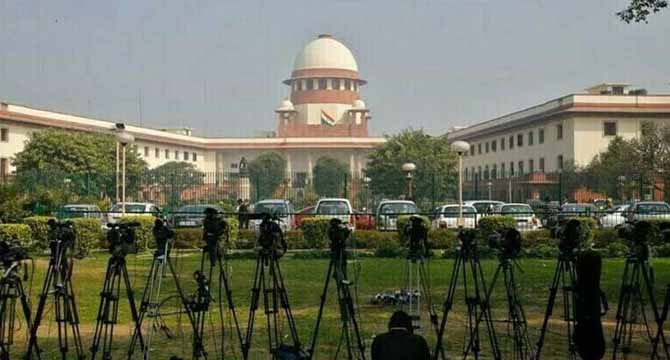International Desk, July 4, 2023: The Supreme Court of India has formed a larger bench to hear the petitions challenging the abrogation of Article 370 of the constitution which grants special status to Indian Illegally Occupied Jammu and Kashmir (IIOJK).
The five-member larger bench has clubbed all the petitions filed in the apex court against the abrogation of Article 370.
The five-member bench includes Chief Justice Dhananjaya Yeshwant Chandrachud, Justice Sanjay Kishan Kaul, Justice Sanjiv Khanna, Justice BR Gavai and Justice Surya Kant. The bench will be headed by Chief Justice Dhananjaya Yeshwant Chandrachud while the case will be taken up on July 11.
More than 20 petitions were filed while challenging the Indian government’s August 2019 decision to abrogate Article 370. The petitions were filed by Shah Faesal and others.
The petitioners claimed that there was violation of constitutional provisions when controversial decision was made.
“The Article 370 case has been pending in the Supreme Court for over two years. The case had not come up after a five-judge bench refused to refer the petitions to a larger bench in March 2020,” according to the Indian media.
The Indian government promulgated an ordinance on August 5, 2019 to abolish Article 370 of the Constitution, as tensions mounted in the disputed valley with unprecedented numbers of Indian troops deployed in the region.
Then-Indian home minister Amit Shah had also introduced a resolution in Rajya Sabha to scrap Article 370. Pakistan had termed the move to revoke Article 370 illegal and reacted strongly.
The move allowed people from rest of the country to acquire property in the disputed territory and settle there permanently. The move was against the international law and all the UN resolutions.
Jammu and Kashmir People’s Democratic Party (JKPDP) President Mehbooba Mufti welcomed the SC’s decision and hoped that justice is upheld and delivered to the people in Kashmir.
Taking to Twitter, she said, “The SC ruling on Article 370 maintained that the provision can be abrogated only on the recommendation of the J&K constituent assembly.”

